八种状语从句知识点自己整理练习题及答案
- 格式:doc
- 大小:248.50 KB
- 文档页数:34
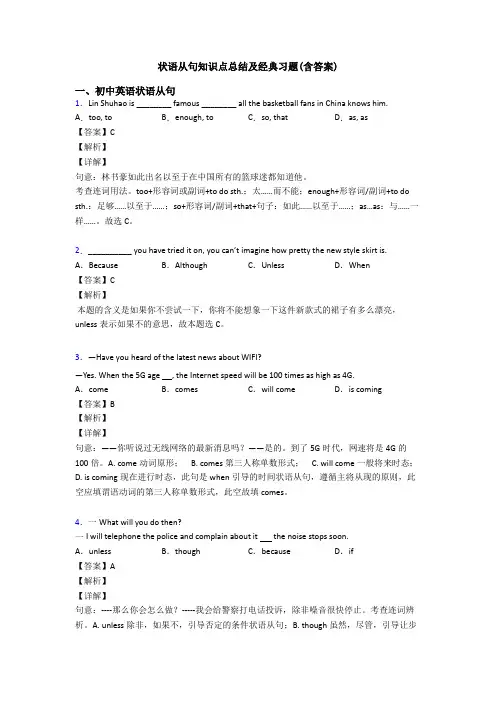
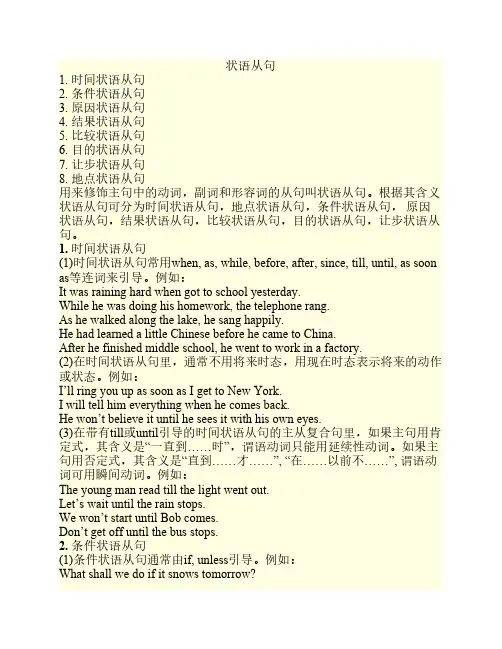
状语从句1. 时间状语从句2. 条件状语从句3. 原因状语从句4. 结果状语从句5. 比较状语从句6. 目的状语从句7. 让步状语从句8. 地点状语从句用来修饰主句中的动词,副词和形容词的从句叫状语从句。
根据其含义状语从句可分为时间状语从句,地点状语从句,条件状语从句,原因状语从句,结果状语从句,比较状语从句,目的状语从句,让步状语从句。
1. 时间状语从句(1)时间状语从句常用when, as, while, before, after, since, till, until, as soon as等连词来引导。
例如:It was raining hard when got to school yesterday.While he was doing his homework, the telephone rang.As he walked along the lake, he sang happily.He had learned a little Chinese before he came to China.After he finished middle school, he went to work in a factory.(2)在时间状语从句里,通常不用将来时态,用现在时态表示将来的动作或状态。
例如:I’ll ring you up as soon as I get to New York.I will tell him everything when he comes back.He won’t believe it until he sees it with his own eyes.(3)在带有till或until引导的时间状语从句的主从复合句里,如果主句用肯定式,其含义是“一直到……时”,谓语动词只能用延续性动词。
如果主句用否定式,其含义是“直到……才……”, “在……以前不……”, 谓语动词可用瞬间动词。
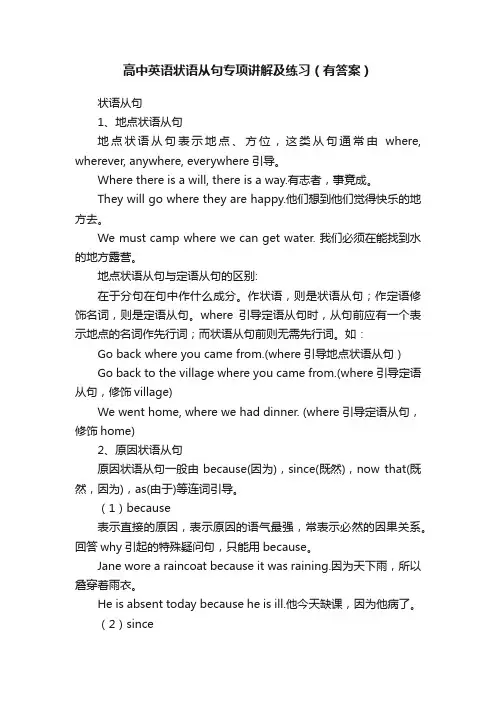
高中英语状语从句专项讲解及练习(有答案)状语从句1、地点状语从句地点状语从句表示地点、方位,这类从句通常由where, wherever, anywhere, everywhere引导。
Where there is a will, there is a way.有志者,事竟成。
They will go where they are happy.他们想到他们觉得快乐的地方去。
We must camp where we can get water. 我们必须在能找到水的地方露营。
地点状语从句与定语从句的区别:在于分句在句中作什么成分。
作状语,则是状语从句;作定语修饰名词,则是定语从句。
where引导定语从句时,从句前应有一个表示地点的名词作先行词;而状语从句前则无需先行词。
如:Go back where you came from.(where引导地点状语从句)Go back to the village where you came from.(where引导定语从句,修饰village)We went home, where we had dinner. (where引导定语从句,修饰home)2、原因状语从句原因状语从句一般由because(因为),since(既然),now that(既然,因为),as(由于)等连词引导。
(1)because表示直接的原因,表示原因的语气最强,常表示必然的因果关系。
回答why引起的特殊疑问句,只能用because。
Jane wore a raincoat because it was raining.因为天下雨,所以詹穿着雨衣。
He is absent today because he is ill.他今天缺课,因为他病了。
(2)since表示对方已经知晓、无须加以说明的原因或事实,语气比because稍弱。
I'll do it for you since you are busy.既然你忙,我来替你做吧。
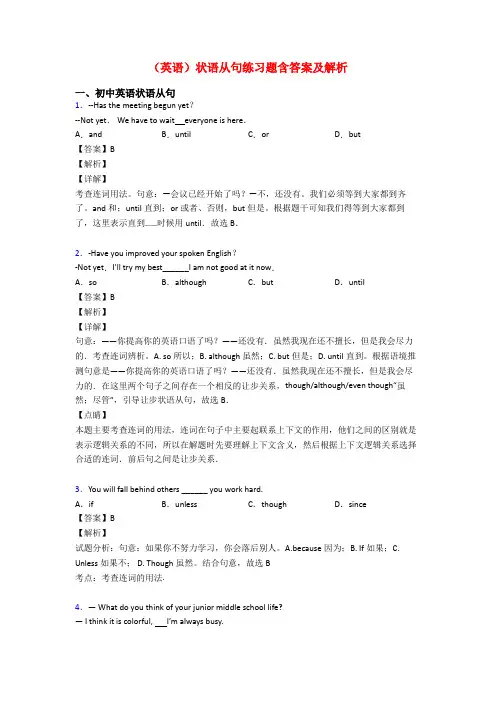
(英语)状语从句练习题含答案及解析一、初中英语状语从句1.--Has the meeting begun yet?--Not yet. We have to wait everyone is here.A.and B.until C.or D.but【答案】B【解析】【详解】考查连词用法。
句意:—会议已经开始了吗?—不,还没有。
我们必须等到大家都到齐了。
and和;until直到;or或者、否则,but但是。
根据题干可知我们得等到大家都到了,这里表示直到……时候用until.故选B.2.-Have you improved your spoken English?-Not yet.I'll try my best______I am not good at it now.A.so B.although C.but D.until【答案】B【解析】【详解】句意:——你提高你的英语口语了吗?——还没有.虽然我现在还不擅长,但是我会尽力的.考查连词辨析。
A. so所以;B. although 虽然;C. but但是;D. until直到。
根据语境推测句意是——你提高你的英语口语了吗?——还没有.虽然我现在还不擅长,但是我会尽力的.在这里两个句子之间存在一个相反的让步关系,though/although/even though“虽然;尽管”,引导让步状语从句,故选B.【点睛】本题主要考查连词的用法,连词在句子中主要起联系上下文的作用,他们之间的区别就是表示逻辑关系的不同,所以在解题时先要理解上下文含义,然后根据上下文逻辑关系选择合适的连词.前后句之间是让步关系.3.You will fall behind others ______ you work hard.A.if B.unless C.though D.since【答案】B【解析】试题分析:句意:如果你不努力学习,你会落后别人。
A.because因为;B. If如果;C. Unless如果不; D. Though虽然。
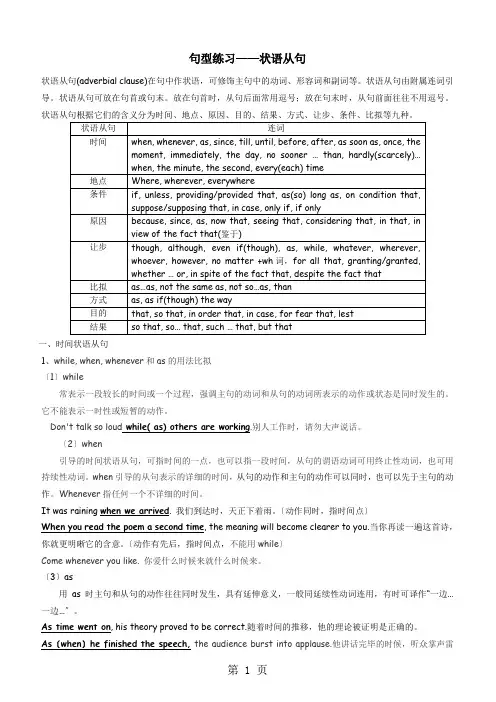
句型练习——状语从句状语从句(adverbial clause)在句中作状语,可修饰主句中的动词、形容词和副词等。
状语从句由附属连词引导。
状语从句可放在句首或句末。
放在句首时,从句后面常用逗号;放在句末时,从句前面往往不用逗号。
一、时间状语从句1、while, when, whenever和as的用法比拟〔1〕while常表示一段较长的时间或一个过程,强调主句的动词和从句的动词所表示的动作或状态是同时发生的。
它不能表示一时性或短暂的动作。
Don't talk so loud while( as) others are working.别人工作时,请勿大声说话。
〔2〕when引导的时间状语从句,可指时间的一点,也可以指一段时间,从句的谓语动词可用终止性动词,也可用持续性动词。
when引导的从句表示的详细的时间,从句的动作和主句的动作可以同时,也可以先于主句的动作。
Whenever指任何一个不详细的时间。
It was raining when we arrived. 我们到达时,天正下着雨。
〔动作同时,指时间点〕When you read the poem a second time, the meaning will become clearer to you.当你再读一遍这首诗,你就更明晰它的含意。
〔动作有先后,指时间点,不能用while〕Come whenever you like. 你爱什么时候来就什么时候来。
〔3〕as用as时主句和从句的动作往往同时发生,具有延伸意义,一般同延续性动词连用,有时可译作“一边…一边…〞。
As time went on, his theory proved to be correct.随着时间的推移,他的理论被证明是正确的。
As〔when〕he finished the speech, the audience burst into applause.他讲话完毕的时候,听众掌声雷动。
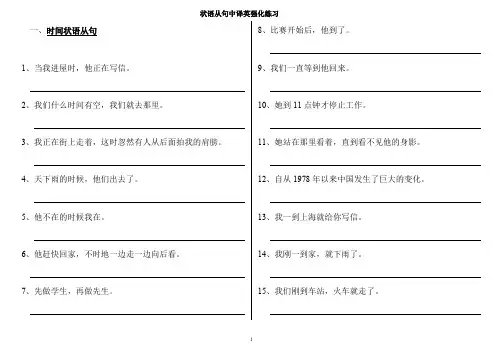
一、时间状语从句1、当我进屋时,他正在写信。
2、我们什么时间有空,我们就去那里。
3、我正在街上走着,这时忽然有人从后面拍我的肩膀。
4、天下雨的时候,他们出去了。
5、他不在的时候我在。
6、他赶快回家,不时地一边走一边向后看。
7、先做学生,再做先生。
8、比赛开始后,他到了。
9、我们一直等到他回来。
10、她到11点钟才停止工作。
11、她站在那里看着,直到看不见他的身影。
12、自从1978年以来中国发生了巨大的变化。
13、我一到上海就给你写信。
14、我刚一到家,就下雨了。
15、我们刚到车站,火车就走了。
16、我们刚开始就被叫停。
17、我每次乘船都晕船。
18、我一听到这首歌,就感到很愉快。
19、下次你来的时候,就会见到他。
二、地点状语从句1、有志者,事竟成。
2、哪里有水,哪里就有生命。
3、你可以随意到你喜欢的任何地方去。
4、无论你去哪都要遵守法律。
三、原因状语从句1、昨天我回来晚了,因为我值班。
2、既然大家都到了,我们开始开会。
3、由于他英语懂得不多,他在字典中查阅这个单词。
4、鉴于天气已经晴朗,我们可以启程了。
5、鉴于他病情严重,我们派人去请医生去了。
四、目的状语从句1、我要把你的电话号码记下来,以免忘记。
2、我把真实情况告诉你,使你能自己作出判断。
3、他们比往常更加努力工作,为了能提前完成工作。
4、多穿点衣服,以免患感冒。
五、结果状语从句1、我们把收音机的音量放大,大家都听到了新闻。
2、他十分激动,以致一句话都说不出来。
3、他说出了这么重要的理由,得到大家的谅解。
4、这是一本十分有意思的书,大家都想看。
六、条件状语从句1、如果我们不怕困难,困难就算不了什么了。
2、除非下雨,我们明天就去那里。
3、只要你努力工作,你就一定能成功。
4、万一我忘了,请提醒我一下。
5、据我所知,那本书下月出版。
七、方式状语从句1、按照我教你的画一只猫。
2、按照人家告诉你做的去做。
3、看上去她好象是生病了。
4、他的行动就好象什么也没有发生。
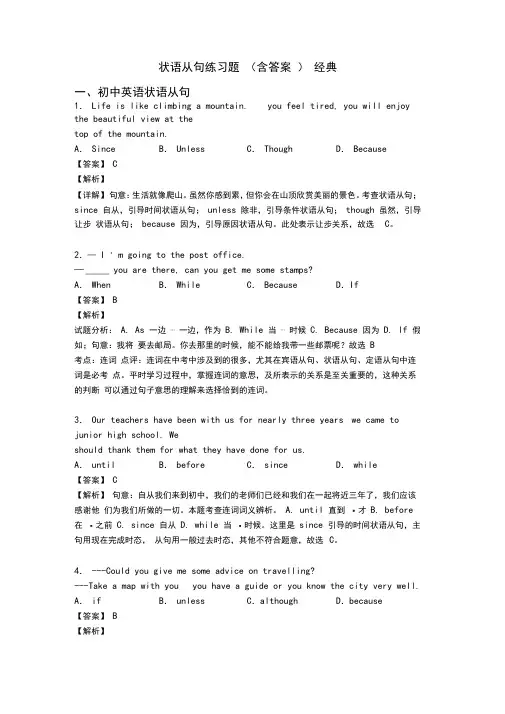
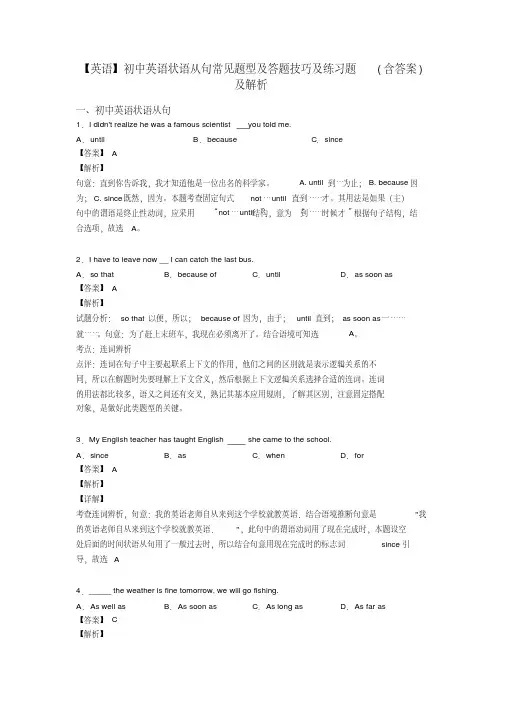
【英语】初中英语状语从句常见题型及答题技巧及练习题(含答案)及解析一、初中英语状语从句1.I didn't realize he was a famous scientist you told me.A.until B.because C.since【答案】A【解析】句意:直到你告诉我,我才知道他是一位出名的科学家。
A. until到…为止;B. because 因直到……才。
其用法是如果(主)为;C. since既然,因为。
本题考查固定句式not…until…根据句子结构,结结构,意为“到……时候才” 句中的谓语是终止性动词,应采用“not…until”合选项,故选A。
2.I have to leave now __ I can catch the last bus.A.so that B.because of C.until D.as soon as【答案】A【解析】试题分析:so that以便,所以;because of因为,由于;until直到;as soon as一……就……。
句意:为了赶上末班车,我现在必须离开了。
结合语境可知选A。
考点:连词辨析点评:连词在句子中主要起联系上下文的作用,他们之间的区别就是表示逻辑关系的不同,所以在解题时先要理解上下文含义,然后根据上下文逻辑关系选择合适的连词。
连词的用法都比较多,语义之间还有交叉,熟记其基本应用规则,了解其区别,注意固定搭配对象,是做好此类题型的关键。
3.My English teacher has taught English she came to the school.A.since B.as C.when D.for【答案】A【解析】【详解】考查连词辨析,句意:我的英语老师自从来到这个学校就教英语.结合语境推断句意是"我的英语老师自从来到这个学校就教英语.",此句中的谓语动词用了现在完成时,本题设空处后面的时间状语从句用了一般过去时,所以结合句意用现在完成时的标志词since引导,故选A4._____ the weather is fine tomorrow, we will go fishing.A.As well as B.As soon as C.As long as D.As far as【答案】C【解析】C 本题考查连词短语用法。
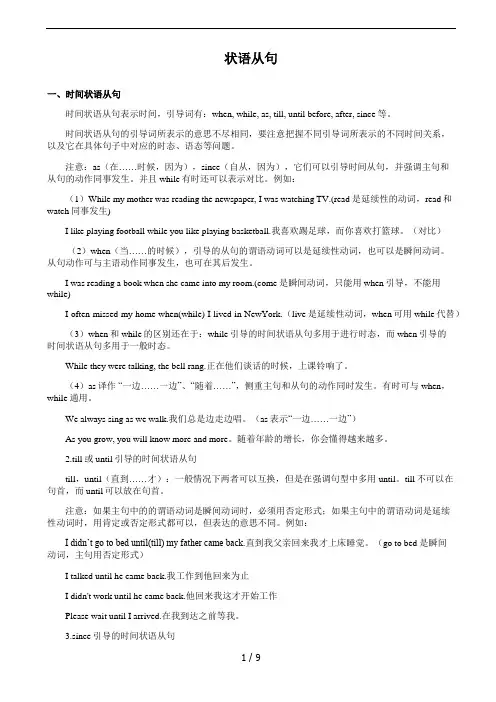
状语从句一、时间状语从句时间状语从句表示时间,引导词有:when, while, as, till, until before, after, since等。
时间状语从句的引导词所表示的意思不尽相同,要注意把握不同引导词所表示的不同时间关系,以及它在具体句子中对应的时态、语态等问题。
注意:as(在……时候,因为),since(自从,因为),它们可以引导时间从句,并强调主句和从句的动作同事发生。
并且while有时还可以表示对比。
例如:(1)While my mother was reading the newspaper, I was watching TV.(read是延续性的动词,read和watch同事发生)I like playing football while you like playing basketball.我喜欢踢足球,而你喜欢打篮球。
(对比)(2)when(当……的时候),引导的从句的谓语动词可以是延续性动词,也可以是瞬间动词。
从句动作可与主语动作同事发生,也可在其后发生。
I was reading a book when she came into my room.(come是瞬间动词,只能用when引导,不能用while)I often missed my home when(while) I lived in NewYork.(live是延续性动词,when可用while代替)(3)when和while的区别还在于:while引导的时间状语从句多用于进行时态,而when引导的时间状语从句多用于一般时态。
While they were talking, the bell rang.正在他们谈话的时候,上课铃响了。
(4)as译作“一边……一边”、“随着……”,侧重主句和从句的动作同时发生。
有时可与when,while通用。
We always sing as we walk.我们总是边走边唱。
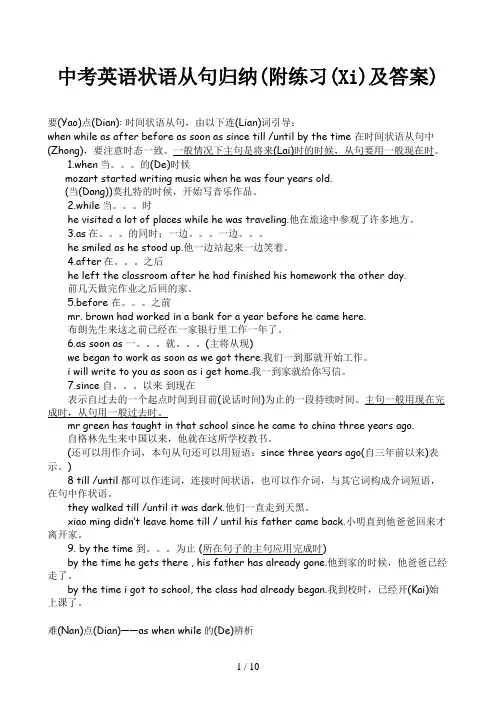
中考英语状语从句归纳(附练习(Xi)及答案)要(Yao)点(Dian): 时间状语从句,由以下连(Lian)词引导:when while as after before as soon as since till /until by the time 在时间状语从句中(Zhong),要注意时态一致。
一般情况下主句是将来(Lai)时的时候,从句要用一般现在时。
1.when当。
的(De)时候mozart started writing music when he was four years old.(当(Dang))莫扎特的时候,开始写音乐作品。
2.while当。
时he visited a lot of places while he was traveling.他在旅途中参观了许多地方。
3.as在。
的同时;一边。
一边。
he smiled as he stood up.他一边站起来一边笑着。
4.after在。
之后he left the classroom after he had finished his homework the other day.前几天做完作业之后回的家。
5.before 在。
之前mr. brown had worked in a bank for a year before he came here.布朗先生来这之前已经在一家银行里工作一年了。
6.as soon as 一。
就。
(主将从现)we began to work as soon as we got there.我们一到那就开始工作。
i will write to you as soon as i get home.我一到家就给你写信。
7.since 自。
以来到现在表示自过去的一个起点时间到目前(说话时间)为止的一段持续时间。
主句一般用现在完成时,从句用一般过去时。
mr green has taught in that school since he came to china three years ago.自格林先生来中国以来,他就在这所学校教书。
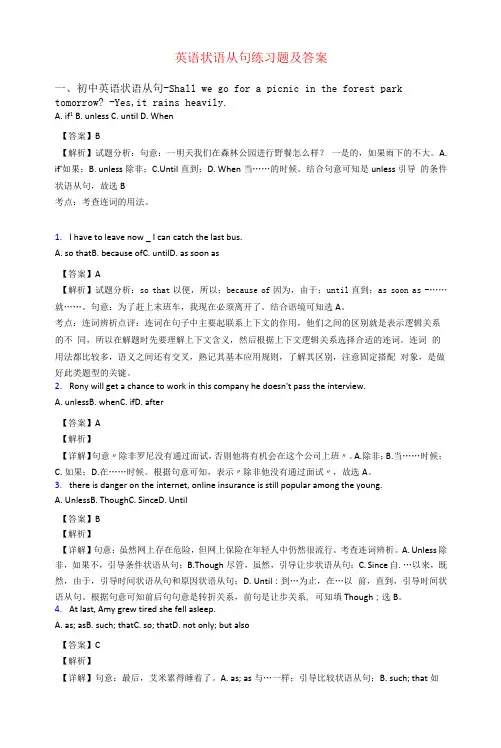
英语状语从句练习题及答案一、初中英语状语从句-Shall we go for a picnic in the forest park tomorrow? -Yes,it rains heavily.A. if1B. unlessC. untilD. When【答案】B【解析】试题分析:句意:一明天我们在森林公园进行野餐怎么样?一是的,如果雨下的不大。
A. if'如果;B. unless除非;C.Until直到;D. When当……的时候。
结合句意可知是unless引导的条件状语从句,故选B考点:考查连词的用法。
1.I have to leave now _ I can catch the last bus.A. so thatB. because ofC. untilD. as soon as【答案】A【解析】试题分析:so that以便,所以;because of因为,由于;until直到;as soon as -……就……。
句意:为了赶上末班车,我现在必须离开了。
结合语境可知选A。
考点:连词辨析点评:连词在句子中主要起联系上下文的作用,他们之间的区别就是表示逻辑关系的不同,所以在解题时先要理解上下文含义,然后根据上下文逻辑关系选择合适的连词。
连词的用法都比较多,语义之间还有交叉,熟记其基本应用规则,了解其区别,注意固定搭配对象,是做好此类题型的关键。
2.Rony will get a chance to work in this company he doesn't pass the interview.A. unlessB. whenC. ifD. after【答案】A【解析】【详解】句意〃除非罗尼没有通过面试,否则他将有机会在这个公司上班〃。
A.除非;B.当……时候;C. 如果;D.在……时候。
根据句意可知,表示〃除非他没有通过面试〃,故选A。
3.there is danger on the internet, online insurance is still popular among the young.A. UnlessB. ThoughC. SinceD. Until【答案】B【解析】【详解】句意:虽然网上存在危险,但网上保险在年轻人中仍然很流行。
状语从句(adverbial clause)复习要点:掌握句法功能,记住连接词语法意义:状语从句是复合句中的一种,整个从句作主句的状语,修饰主句中的谓语动词、形容词、或副词。
置于句首时,状语从句后面一般要有逗号隔开;如果状语从句置于句尾,则从句一般不用逗号。
按照所作的状语和意义可分为时间、地点、原因、目的、结果、条件、让步、方式和比较等九种状语从句。
具体如下:一、时间状语从句(Adverbial Clauses of Time)时间状语从句通常由when,whenever,as,while,before,after,assoon as,since,once,no sooner...then,hardly/scarcely...when,tiLl/until 以及the moment,directly,immediately,the second,thefirst time,next time,every time,等引导。
1.由when,as,while 引导的状语从句:1)when 引导时间状语从句,表示当···,其谓语动词可以是延续性的,也可以是非延续性的,其作用最广泛。
When spring comes,trees turn green,When it rains,I usually go to work by taxi.When we were having lunch,the light went out.I will ring you up when I return.When she pressed the button,the lift stopped.He was eating his breakfast when the doorbell rang.be about to do...when...“就在那/这时,(突然)另一个动作发生了,在这儿只能用when。
状语从句1.在主从复合句中修饰主句中的动词,形容词,副词等的从句叫状语从句。
可分为,时间状语从句,地点状语从句,原因,目的,结果,条件,让步,比较和方式状语从句。
2.时间状语从句起时间状语作用的句子;可放在句首,句中和句尾常用引导词:when,while, as, after, before, since, till, until, the moment, hardly … when , no sooner … thanwhen, while, as的用法1)when 用法最广,常可代替while和as, 在while 引导的从句中,动词只能是延续性的When the fire broke out, all the students were sleeping soundly.The telephone rang while I was taking a bath.2)当两个表示时间延续的动作同时发生而又有对比意味的时候,用while,在这样的复合句中,主句从句的时态通常是相同的。
Father was preparing a report while I was playing PC games.3)常用as 的情况:一边…一边;表示随着短暂动作的发生,另一行为伴随发生As he talked on, he got more and more excited.until和till的用法表示“一直到…”时,主句和从句都用肯定式;I will wait until/ till the concert is over.表示“直到…才…”是,主句用否定,从句用肯定式。
They can’t go until Sunday.since的用法since引导的从句中,如果是持续性动词,往往理解为某一状态的终止。
He has written to me frequently since he was ill. 自从他病好以来,他常写信给我。
状语从句〔一〕状语从句概述〔二〕状语从句详解1. 时间状语从句2.地点状语从句3.条件状语从句4.原因状语从句5.目的状语从句6.结果状语从句7.让步状语从句8. 比拟状语从句9.方式状语从句练习一一. 单项填空1. _______ he’s old, he can still carry this heavy bag.A. ThoughB. SinceC. ForD. So2. ---Do you know if he _______ to play basketball with us"---I think he will e if he ______ free tomorrow.A. es; isB. es; will beC. will e; isD. will e; will be3. In the zoo if a child _____ into the water and can’t swim, the dolphins may e up ______ him.A. will fall; to helpB. falls; to helpC. will fall; helpD. falls; helping4. I don’t remember ________ he worked in that city when he was young.A. whatB. whichC. whereD. who5. We will stay at home if my aunt ________ to visit us tomorrow.A. esB. eC. will eD. is ing6. The police asked the children _______ cross the street ________ the traffic lights turned green.A. not; beforeB. don’t; whenC. not to; untilD. not; after7. I was late for class yesterday _______ there was something wrong with my bike.A. whenB. thatC. untilD. because8. I’ll go swimming with you if I ________ free tomor row.A. will beB. shall beC. amD. was9. In the e*am, the ________ you are, ______ the _______ mistakes you will make.A. careful; littleB. more careful; fewestC. more careful; fewerD. more careful; less10. You should finish your lessons _______ you go out to play.A. beforeB. afterC. whenD. while11. I hurried _____ I wouldn’t be late for class.A. sinceB. so thatC. as ifD. unless12. When you read the book, you’d better make a mark _______ you have any questions.A. whichB. thatC. whereD. though13. The teacher raised his voice _______ all the students could hear him.A. forB. so thatC. becauseD. in order14. He took off his coat _______ he felt hot.A. becauseB. asC. ifD. since15. It is ______ that we’d like to go out for a walk.A. a lovely dayB. too lovely a dayC. so lovely a dayD. such lovely a day16. Mary had ______ much work to do that she stayed at her office all day.A. suchB. soC. tooD. very17. _______ I felt very tired, I tried to finish the work.A. AlthoughB. BecauseC. AsD. As if18. ______ the day went on, the weather got worse.A. WithB. SinceC. WhileD. As19. ______ well you can drive, you must drive carefully.A. So long asB. In order thatC. No matter howD. The moment20. Write to me as soon as you ________ to Beijing.A. will getB. getC. gettingD. got二. 根据中文意思完成以下英语句子1. 不管他跟我开什么玩笑,我都不生气。
状语从句练习题及答案1. 尽管他很努力,但他没有通过考试。
- 答案:Though he studied hard, he did not pass the exam.2. 我们一到达那里,就立即开始工作。
- 答案:As soon as we arrived there, we started working immediately.3. 只有当你准备好了,我们才会开始。
- 答案:We will start only when you are ready.4. 因为天气不好,比赛被推迟了。
- 答案:Because the weather was bad, the match was postponed.5. 无论何时你来,我都会在这里等你。
- 答案:Whenever you come, I will be here waiting for you.6. 如果你不介意的话,我可以借你的书。
- 答案:If you don't mind, I can borrow your book.7. 除非他改变态度,否则他将不会成功。
- 答案:Unless he changes his attitude, he will not succeed.8. 他如此专心于工作,以至于没有听到电话响。
- 答案:He was so absorbed in his work that he didn't hear the phone ring.9. 她一完成作业,就出去和朋友见面了。
- 答案:She went out to meet her friends as soon as she finished her homework.10. 只要我们团结一致,我们就能克服任何困难。
- 答案:As long as we stand united, we can overcome any difficulty.答案解析- 状语从句通常位于主句之前或之后,有时也可以用逗号与主句隔开。
(完整版)八种状语从句知识点自己整理练习题及答案英语语法专项之状语从句1. 时间状语从句2. 条件状语从句3. 原因状语从句4. 结果状语从句5. 比较状语从句6. 目的状语从句7. 让步状语从句8. 地点状语从句用来修饰主句中的动词,副词和形容词的从句叫状语从句。
根据其含义状语从句可分为时间状语从句,地点状语从句,条件状语从句,原因状语从句,结果状语从句,比较状语从句,目的状语从句,让步状语从句。
各类状语从句连接词(短语)一览表:日寸I、可when, while, as, as soon as, since, until, after, beforeas long as (长达之久)条件If, un less,as/so long as只要)原因As, because, si nee as/so long as既然,因为)地点Where 目的So that(为了), in order that结果So that (方便),so…that, such …that 让步though, although, even if, however 方式As比较tha n, (no t)as …as1. 寸、状语从句寸、状语从句常见的从属连词有:(注意其汉语意义)when, while, as, before, after, since, until (till) once as soon as, the moment, the minute, immediately, directly, each/every time, the first time, the last time, next time, by the time, whe never 等。
例如:Every/Each time I was in trouble, he would come to my help.I thought her nice and honest the first time I met her.注意:(1)when, while, as的区别:1)when引导从句时,主从句的动作有先有后,也可以同时进行,从句的动作可以是持续性的,也可以是短暂的。
状语从句练习(含答案和解析)一、选择题1. — Could you please tell me ________________?— Sure, it was invented by Thomas Edison in 1879.A. when was the light bulb inventedB. when the light bulb was inventedC. the light bulb was invented whenD. when the invented the light bulb【答案】B【解析】在宾语从句中,应该使用陈述语序,所以答案选B。
2. — She hurt herself while she ________________ the piano. — Oh no, hope she's okay.A. playedB. is playingC. was playingD. had played【答案】C【解析】句子发生的时间是过去,所以应该使用过去进行时,答案选C。
3. The book is not on the table, ________________ I last saw it.A. soB. becauseC. butD. although【答案】A【解析】根据句意,表达的是因果关系,所以应该使用连词so,答案选A。
4. I'll join you for dinner ________________ it doesn't rain.A. whetherB. ifC. soD. because【答案】B【解析】根据句意,表示条件,所以应该使用if,答案选B。
5. — ________________ you study hard, you won't pass the exam.— I know, I'll try my best.A. IfB. UnlessC. WhetherD. Although【答案】B【解析】根据句意,表示否定条件,所以应该使用unless,答案选B。
英语语法专项之状语从句1. 时间状语从句2. 条件状语从句3. 原因状语从句4. 结果状语从句5. 比较状语从句6. 目的状语从句7. 让步状语从句8. 地点状语从句用来修饰主句中的动词,副词和形容词的从句叫状语从句。
根据其含义状语从句可分为时间状语从句,地点状语从句,条件状语从句,原因状语从句,结果状语从句,比较状语从句,目的状语从句,让步状语从句。
各类状语从句连接词(短语)一览表:时间 when, while, as, as soon as, since, until, after, before,as long as(长达……之久)条件 If, unless,as/so long as(只要)原因 As, because, since,as/so long as(既然,因为) 地点 Where目的 So that(为了), in order that结果 So that(方便), so…that, such…that 让步 though, although, even if, however 方式 As比较 than, (not)as…as1. 时间状语从句时间状语从句常见的从属连词有:(注意其汉语意义)when, while, as, before, after, since, until (till) once as soon as, the moment, the minute, immediately, directly, each/every time, the first time, the last time, next time, by the time, whenever等。
例如:Every/Each time I was in trouble, he would come to my help.I thought her nice and honest the first time I met her.注意:(1)when, while, as的区别:1)when引导从句时,主从句的动作有先有后,也可以同时进行,从句的动作可以是持续性的,也可以是短暂的。
如:When I got to the airport, the plane had already taken off. (主先从后)(短暂性)When I lived there, I used to go to the seaside on Sundays. (同时) (持续性)When the movie ended, the people went back. (从先主后)2)while侧重主从句动作的对比,且从句的动词必须是持续性的。
如:While we were chatting she was looking at the time table on the wall.3)as引导从句时侧重主从句动作同时或几乎同时进行,从句的动作可以是持续性的,也可以是短暂的。
如:Sometimes I watch TV as I am having breakfast.4)when和while还可以是并列连词,意思分别是“就在这时”,“然而”。
如:I was having a rest on the sofa when the telephone rang.They were surprised that a child should work out the problem while they couldn’t .注:并列连词when常用与以下句型中:①…was/were doing…when…(正在做…突然)②…was/were about to do…when…(刚要做…突然)③…was/were on the point of doing…when…(刚要做…突然)④…had just done…when….(刚一…就)⑤Hardly/Scarcely had…done…when…(刚一…就)(2)before引导从句时,词义非常灵活,注意下列句子中的before的词义:1.Before I could get in a word, the tailor had measured me.(还没来得及…就)2.We hadn’t run a mile before he felt tired.(还没…就)3.We had sailed 4 days before we saw land.(…才…)4.Please write it down before you forget it.(趁还…没就)(3)till (until) 和not…till (until)1) till (until):主句谓语动词必须是持续性的,意思是“到…为止“如:He remained there till/until she arrived.2) not…till (until)…: 主句谓语动词必须是短暂性的,意思是“直到…才”如:She won’t go to bed till/until he returns home.3) not…until还有强调式和倒装式:强调句:It is not until he returns home that she will go to bed.倒装句:Not until he returns home will she go to bed.(4)几个极易混淆的时间状语从句:1) It was +时间点+when…(当的时候时间是)It was 5 am when we arrived at the village.2) It was/will be+时间段+before…(没过…就/过了…才)It was/will be two weeks before we met/meet again.3) It is /has been +时间段+since…(自从…以来有…)It is/has been 3 years since we last met.突破点:一看be动词的时态,二看时间段还是时间点。
注意:在“It is /has been +时间段+since…”句型中,从句的动词必须是短暂性的,如果是延续性的动词,时间要从从句的动作结束时算起。
如:It is 3 years since I smoked.( 我戒烟有三年了)补充:as soon as, immediately, directly, instantly, the moment, the minute, the instant, no so oner…than…, hardly/scarcely….when….和once这些从属连接词引导的从句都表示从句的动作一发生,主句的动作随即就发生,常译为“一…就…”。
从句中一般时态代替将来时态。
every time, each time, next time, the first time, any time, all the time等名词短语用来引导时间状语从句,表示“每当…..,每次…..;下次……”等。
1. It was quiet ________ those big trucks started coming through the town.A. beforeB. afterC. untilD. unless2. It seemed only seconds ________ the boy finished washing his face.A. whenB. beforeC. afterD. even if3. Hardly had he reached the school gate ________ the bell rang.A. whileB. whenC. asD. as soon as4.We were told that we should follow the main road _____ we reached the centra l railway station. A. whenever B. until C. while D. wherever5. I recognized you ________ I saw you at the airport.A. the momentB. whileC. afterD. once6. He was about to go to bed ________ the doorbell rang.A. whileB. asC. beforeD. when7.________I listen to your advice, I get into trouble.A. Every timeB. WhenC. WhileD. Until8. _____ John was watching TV, his wife was cooking.A. AsB. As soon asC. WhileD. Till9. The children ran away from the orchard(果园) ______ they saw the guard. A. the moment B. after C. before D. as10. No sooner had I arrived home _____ it began to rain.A. whenB. whileC. asD. than11. Several weeks had gone by _____ I realized the painting was missing.A. asB. beforeC. sinceD. when12. It _____ long before we ____ the result of the experiment.A. will not be; will knowB. is; will knowC. will not be knowD. is; know 13. –What was the party like?--Wonderful. It’s years _____ I enjoyed myself so much.A. afterB. beforeC. whenD. since14. The new secretary is supposed to report to the manager as soon as she_____.A. will arriveB. arrivesC. is going to arriveD. is arriving15. _____ got into the room _____ the telephone rang.A. He hardly had; thenB. Hardly had he; whenC. He had not; thenD. Not had he; when16. No sooner had he finished his talk _____ he was surrounded by the workers.A. asB. thenC. thanD. when17. –Did you remember to give Mary the money you owed her? --Yes, I gave it t o her _____ I saw her.A. whileB. the momentC. suddenlyD. once18. I thought her nice and honest _____ I met her.A. first timeB. for the first timeC. the first timeD. by the first time19. He will have learned English for eight years by the time he _____ from the u niversity next year.A. will graduateB. will have graduatedC. graduatesD. is to graduate20. The moment the 28th Olympic Games _____ open, the whole world cheered.A. declaredB. have been declaredC. have declaredD. were declared答案:CBBBA DACAD BCDBB CBCCD2. 条件状语从句条件状语从句引导词:if(如果) ,unless(除非), in case(以防) 时态:主将从现(可能会发生的事情)主现从现(肯定会发生/祈使句)1.if引导的条件状语从句,可位于前面或后面,但是如果放在后面,主从句用逗号隔开。